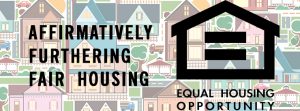Affirmatively Furthering Fair Housing in a Trump Administration: Regional Leadership Needed More than Ever

Photo courtesy of the NAACP Legal Defense and Educational Fund, Inc.
By Lisa A. Sturtevant, PhD
Fair housing never emerged as an issue in the presidential election; however, the new President and his HUD secretary and Attorney General will have responsibility for overseeing the enforcement of new fair housing laws, including the Affirmatively Furthering Fair Housing (AFFH) rule and the disparate impact court decision. There is uncertainty about what a Trump Presidency will mean for housing nationally, but given his selection of Ben Carson as HUD Secretary, it seems more important than ever to re-commit to working regionally to support the goals of fair housing and access to opportunity here in the Washington, DC metro area.
It has been over a year since the U.S. Department of Housing and Urban Development published the Affirmatively Furthering Fair Housing (AFFH) rule that established a new housing needs assessment process (replacing the analysis of impediments) with the Assessment of Fair Housing (AFH). The AFFH rule lays out a new procedure for local jurisdictions to assess areas of concentrated poverty, to identify disparities in access to good schools, transit and other amenities, and to evaluate unmet housing needs among certain subpopulations, including racial and ethnic minorities and persons with disabilities. In addition, for the first time HUD is providing a trove of local data to help localities identify patterns of demographic change. The goal of the AFFH rule is to bring greater guidance to localities for “affirmatively furthering fair housing” as mandated in the Housing Act of 1968.
Despite some of the rhetoric, the new regulations reflect only an incremental change to HUD’s approach to enforcing fair housing and is designed to encourage a more intentional assessment of whether the goals of the Fair Housing Act are being met. However, the AFFH rule has been castigated as a vast overreach by the Federal government into local autonomy, and the change in leadership at the Federal level will likely give broader voice to those claims.
During the campaign, President-elect Trump said he wanted to dismantle the AFFH rule. Donald Trump’s company has been sued by the Justice Department for violating fair housing laws in New York. In the 1970s, Trump’s father was arrested in Prince George’s County while allowing an apartment complex he owned fall into disrepair and for subjecting African American tenants to deplorable housing conditions. It’s not likely that a President Trump will take the lead on promoting fair housing from the White House. Trump’s pick for HUD Secretary, Ben Carson, has given every indication that he will not be a champion for fair housing at the Federal level either. He has called the Affirmatively Furthering Fair Housing Rule a “mandated social-engineering scheme” and a policy indicative of a “communist” country.
The Region Should Be a Leader in Promoting its Own Fair Housing Goals
With likely backpedaling on AFFH at the Federal level, the Washington DC metropolitan area should remain committed to advancing fair housing in the region. Now, more than ever, local elected officials need to be leaders for promoting access and opportunity for all members of our community.
Regional discussions about AFFH are already underway. Last spring, the Metropolitan Washington Council of Governments partnered with Enterprise Community Partners and the National Housing Conference to host a full-day training and information sharing session around the AFFH rule. The primary objective of the convening was to discuss the data component of the assessment tool but the conversation shed light on the entire AFH process. At the meeting, we had representatives from HUD, as well as from the Baltimore area, which recently completed a regional housing plan.
This meeting led to further discussions among local Housing Directors at the Metropolitan Washington Council of Governments (MWCOG), but momentum around AFFH slowed over the summer. Given the road ahead, now seems like a good time to re-energize regional partners around fair housing. The lack of Federal leadership is one important reason for mobilization. But there is increasing evidence that regions that are more racially and economically integrated have stronger, more resilient local economies.
There are several things we can do now which would not only help support housing options and integration throughout the region but could also allow us to act proactively—to do something!—in the wake of the unprecedented Presidential election:
Produce data on housing needs and opportunities more efficiently. We learned in our March AFFH meeting that HUD is providing a tremendous amount of data to localities, but jurisdictions are advised by the new rule to make use of locally-generated data. Rather than each jurisdiction analyzing its own data, MWCOG should facilitate a regional data analysis exercise that can help with local housing plans but also help jurisdictions connect regionally.
Consider a regional assessment of fair housing. HUD recommends, though does not really incentivize, a regional approach to assessing housing needs and developing strategies. While each local jurisdiction in the Washington DC area will still develop its own financial, land use and other tools to meet local housing needs, there may be some degree of regional assessment that could be undertaken. Local elected officials, along with housing and planning directors, should become better informed about what it would take to do a regional assessment of fair housing, and whether some type of regional approach is possible.
Share best practices. At the very least, local jurisdictions in the Washington DC region need to do a better job at sharing best practices for expanding housing options. In the last few years, many jurisdictions in the region have conducted housing studies that have led to the development of policy recommendations. The policies and plans should be shared across jurisdictions through MWCOG or another regional body so that jurisdictions can learn from each other and possibly help promote consistency in policies and regulations throughout the region.
Focus on community engagement. There is no silver bullet that we have yet to discover that will solve our region’s housing challenges. Jurisdictions in the Washington DC region are among the most innovative communities in the country in terms of affordable housing tools. We know what needs to be done. The major obstacle that remains is building political will and responding to community opposition to housing, particularly multi-family housing and housing affordable to low-income individuals and families. We should work together to solve the NIMBY (not in my backyard) issue by figuring out how to respond to concerns about density, schools, and parking; how to provide elected officials with education and information they can use at public meetings; and how to have conversations that promote inclusion and tolerance.
On that last point, I think there would be a lot of people in our region who would want to be part of that conversation right now.






Leave a Reply
Want to join the discussion?Feel free to contribute!